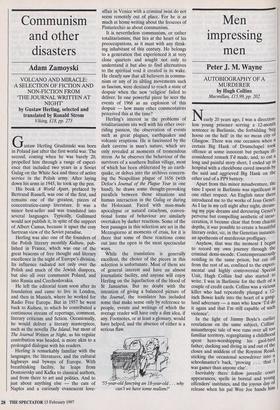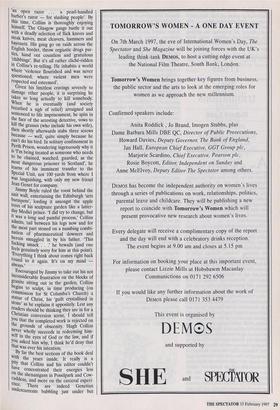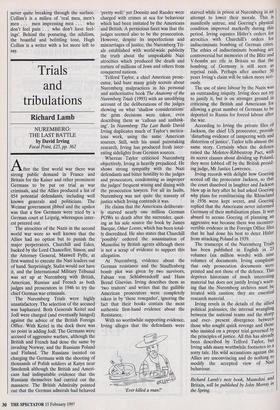Men impressing men
Peter J. M. Wayne
AUTOBIOGRAPHY OF A MURDERER by Hugh Collins Macmillan, £15.99, pp. 202 Nearly 20 years ago, I was a direction- less young prisoner serving a 12-month sentence in Barlinnie, the forbidding 'beg hoose on the hell' in the no mean city of Glasgow. There was one occasion when a certain Big Hank of Drumehapel took offence at some innocent but perhaps ill- considered remark I'd made, and, to cut .a long and painful story short, I ended up 111 hospital with a cheekbone caved inwards by the said and aggrieved Big Hank on the other end of a PP9 battery. Apart from this minor misadventure, the time I spent in Barlinnie was significant in one other respect. An English tutor there introduced me to the works of Jean Genet. As I lay in my cell night after night, dream- ing my pipe dreams and devouring Genet's perverse but compelling aesthetic of incar- ceration, it became clear that from chaotic depths, it was possible to create a beautiful literary order, viz, in the Genetian instance, an apotheosis of murderous profligacy. Anyhow, that was the moment I began to record my own journey through the criminal demi-monde. Contemporaneously residing in the same prison, but cut off from the rest of us, confined to the experi- mental and highly controversial Special Unit, Hugh Collins had also started to write. I was in Barlinnie for the theft of a couple of credit cards. Collins was a vicious killer who had repeatedly plunged a 12- inch Bowie knife into the heart of a gang- land adversary — a man who knew 'I'd do it again and that I'm still capable of such violence'.
In the light of Jimmy Boyle's earlier revelations on the same subject, Collins, misanthropic tale of woe runs over all too familiar territory, regurgitating a childhood spent hero-worshipping his gaol-bird father, ducking and diving in and out of the closes and middens of the Royston Road, sticking the occasional screwdriver into a schoolmaster's back, 'proving . . . that I was gamer than anyone else'. Inevitably there follow juvenile court appearances, spells in borstal and young offenders' institutes, and the joyous day of release when his pal Wee Joe hands him 'an open razor . . . a pearl-handled barber's razor — for slashing people'. By this time, Collins is thoroughly enjoying himself. The Glasgow gangs battle it out with a deadly selection of flick knives and steak knives, meat cleavers, hammers and bayonets. His gang go on raids across the English border, throw orgiastic drugs par- ties, hand out countless and gratuitous `chibbings'. But it's all rather cliché-ridden in Collins's re-telling. He inhabits a world where 'violence flourished and was never questioned; where violent men were respected and esteemed'.
Given his limitless cravings severely to damage other people, it is surprising he takes so long actually to kill somebody. When he is eventually (and society breathed a sigh of relief) arraigned and sentenced to life imprisonment, he spits in the face of the arresting detective, vows to kill the grasses (who include his own wife), then shortly afterwards stabs three screws because — well, quite simply because he can't do his bird. In solitary confinement in Perth Prison, wondering ingenuously why it `Pm being treated as someone who needs to be chained, watched, guarded, as the most dangerous prisoner in Scotland', he learns of his imminent transfer to the Special Unit, not 100 yards from where I was languishing, with only my new friend Jean Genet for company. Jimmy Boyle ruled the roost behind the unit wall, entertaining the Edinburgh 'arts barmpots', lording it amongst the apple trees of his sculpture garden like a latter- day Medici prince. 'I did try to change, but it was a long and painful process,' Collins admits, tail between his legs now and for the most part stoned on a numbing combi- nation of pharmaceutical downers and heroin smuggled in by his father. 'This fucking smack . . .' he bewails (and one feels genuinely sorry for him at this point). Everything I think about comes right back round to it again. It's on my mind - always.'
Encouraged by Jimmy to take out his not inconsiderable frustration on the blocks of granite sitting out in the garden, Collins begins to sculpt, in time producing (on commission for St Columba's Church) a statue of Christ, his 'guilt crystallised in stone' as he explains it appositely. Lest any readers should be thinking they are in for a Christian conversion scene, I should tell You that the completed work is rejected on the grounds of obscenity. Hugh Collins never wholly succeeds in redeeming him- self in the eyes of God or the law, and if You asked him why, I think he'd deny that that was ever his intention.
with far the best sections of the book deal wuh. the years inside. It really is a Pity that Collins and his editor couldn't have concentrated their energies less on the shenanigans in Possilpark and Cow- caddens, and more on the carceral experi- ence. There are indeed Genetian undercurrents bubbling just under but never quite breaking through the surface. Collins's is a milieu of 'real men, men's men . . . men impressing men . . . who don't feel pain . . . who don't have feel- ings'. Behind the posturing, the nihilism, the boastful and belittling tone, Hugh Collins is a writer with a lot more left to say.




























































 Previous page
Previous page